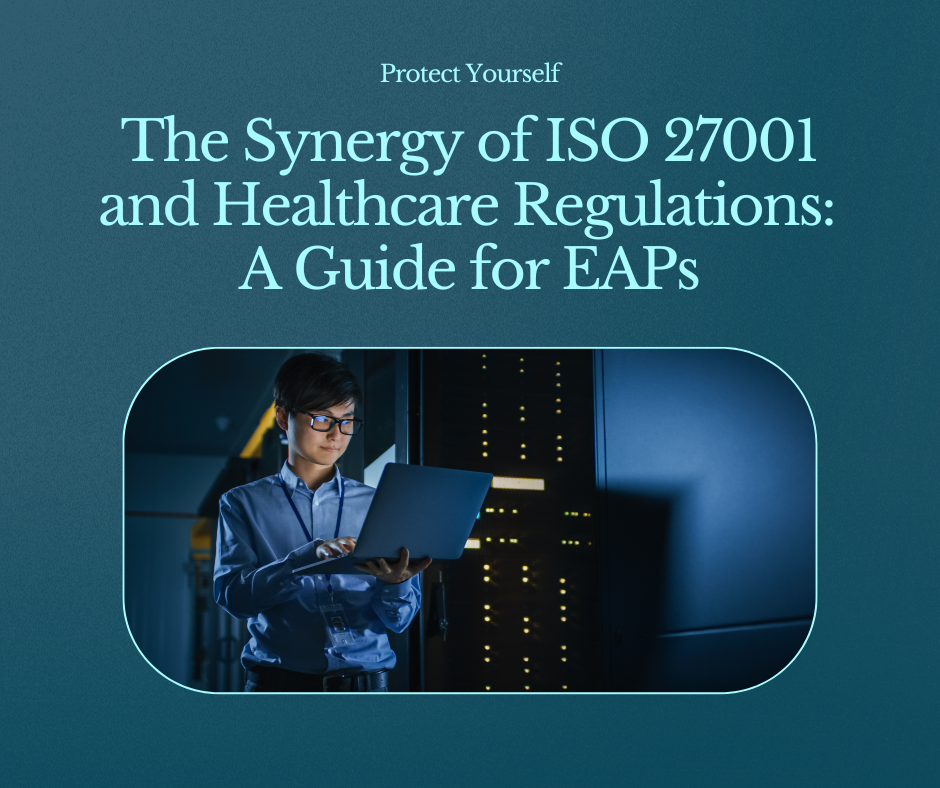Running an ISO 27001 security program can be highly beneficial for Employee Assistance Programs (EAPs) in maintaining their HIPAA (Health Insurance Portability and Accountability Act) and HITECH (Health Information Technology for Economic and Clinical Health Act) requirements. ISO 27001 is an internationally recognized standard for information security management systems (ISMS) that provides a comprehensive framework for establishing, implementing, maintaining, and continuously improving information security practices within an organization.
Here’s why ISO 27001 is a suitable choice for EAPs looking to maintain their HIPAA and HITECH compliance:
1. Comprehensive Security Framework:
ISO 27001 provides a structured and comprehensive framework for managing information security risks. It covers a wide range of security domains, including data protection, access control, incident response, and business continuity planning. EAPs can use this framework to establish and document their information security policies, procedures, and controls, which align with the requirements of both HIPAA and HITECH.
2. Risk Management:
ISO 27001 emphasizes the importance of a risk-based approach to information security. EAPs can conduct thorough risk assessments to identify vulnerabilities and threats related to the confidentiality, integrity, and availability of sensitive data, including PHI (Protected Health Information). By addressing these risks systematically, EAPs can better safeguard patient data in compliance with HIPAA and HITECH requirements.
3. Legal and Regulatory Alignment:
ISO 27001 is designed to align with various international and industry-specific regulations and standards. While it is not a replacement for HIPAA or HITECH compliance, it provides a strong foundation that can help EAPs meet many of the security and privacy requirements mandated by these regulations. EAPs can map ISO 27001 controls to specific HIPAA and HITECH requirements to ensure alignment.
4. Continuous Improvement:
ISO 27001 promotes a culture of continuous improvement in information security. EAPs can regularly assess and enhance their security measures to adapt to evolving threats and regulatory changes. This proactive approach is essential in maintaining HIPAA and HITECH compliance, as these regulations require organizations to keep their security practices up to date.
5. Third-Party Assurance:
EAPs often work with healthcare providers, insurers, and other entities that require assurance regarding their security practices. Achieving ISO 27001 certification provides a level of trust and confidence to partners and stakeholders that the organization is committed to robust information security management. This can be particularly valuable when collaborating with healthcare organizations that are highly sensitive to data security concerns.
6. Documentation and Evidence:
ISO 27001 mandates the creation and maintenance of extensive documentation, including policies, procedures, risk assessments, and audit records. These documents serve as valuable evidence of security measures in place, which can be critical in demonstrating compliance with HIPAA and HITECH requirements during audits and assessments.
In summary, running an ISO 27001 security program can be highly advantageous for Employee Assistance Programs seeking to maintain HIPAA and HITECH compliance. It provides a structured and internationally recognized framework for managing information security, aligns with regulatory requirements, promotes continuous improvement, and enhances trust with stakeholders. While ISO 27001 is not a substitute for compliance with specific healthcare regulations, it can greatly support EAPs in their efforts to protect sensitive patient data and ensure regulatory compliance.

